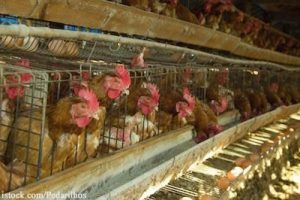The American Society for the Prevention of Cruelty to Animals (ASPCA) has sent a letter to the National Chicken Council (NCC), asking them to update guidelines for humane handling and living conditions for chickens. They say that “current unprecedented growth rates and standard living conditions of chickens not only pose serious concerns for their welfare, but may also present food safety risks.”
 A report from May 2011 by the Humane Society of the United States found that sixteen scientific studies showed hens confined in cages had higher rates of Salmonella, the leading cause of food poisoning related deaths in the United States. A European Food Safety Authority analysis found 43% lower odds of Salmonella contamination in cage-free barns. Free-range birds had 98% lower chance of Salmonella contamination.
A report from May 2011 by the Humane Society of the United States found that sixteen scientific studies showed hens confined in cages had higher rates of Salmonella, the leading cause of food poisoning related deaths in the United States. A European Food Safety Authority analysis found 43% lower odds of Salmonella contamination in cage-free barns. Free-range birds had 98% lower chance of Salmonella contamination.
Salmonella bacteria can infect the ovaries of hens, leading to eggs that are contaminated on the inside. The bacteria survive cooking to temperatures up to 165 degrees F; sunny-side up, undercooked, and raw eggs will contain the live pathogens.
The ASPCA wants to see stocking densities that give chickens more space, natural light in sheds so the chickens move around in the daytime and rest at night, and environmental enrichment to give the birds a place to perch. The letter states that “most chickens today grow so big, so fast that they struggle to stay standing and spend much of their lives lying in their own waste with open sores that can act as gateways to infection.” Near constant lighting contributes to sleep deprivation and stress. They would also like to see genetic research into slower growing birds so they suffer from lower rates of heart failure, labored breathing, and lameness. The European Union banned small cages this year and now requires that chickens be kept in free range barns or enriched cages. In Sweden, one of the countries to adopt this law, public health officials have achieved “efficient control” of Salmonella.
Tom Super, NCC spokesman, responded to the letter by saying, “the U.S. national broiler stock is incredibly healthy and is the envy of the world. Mortality and condemnation rates for broilers, the most sensitive indicators of the health and well being of any flock, are at historic lows.”
Meanwhile, the Foster Farms Salmonella outbreak linked to raw and cooked chicken continues. As of October 30, 2013 (the last official update), at least 362 people in 21 states are ill with antibiotic-resistant Salmonella Heidelberg infections. Almost 40% of those patients have been hospitalized. And since the multiplier for Salmonella outbreaks is 30.3, that means almost 11,000 people have been sickened in this outbreak.




